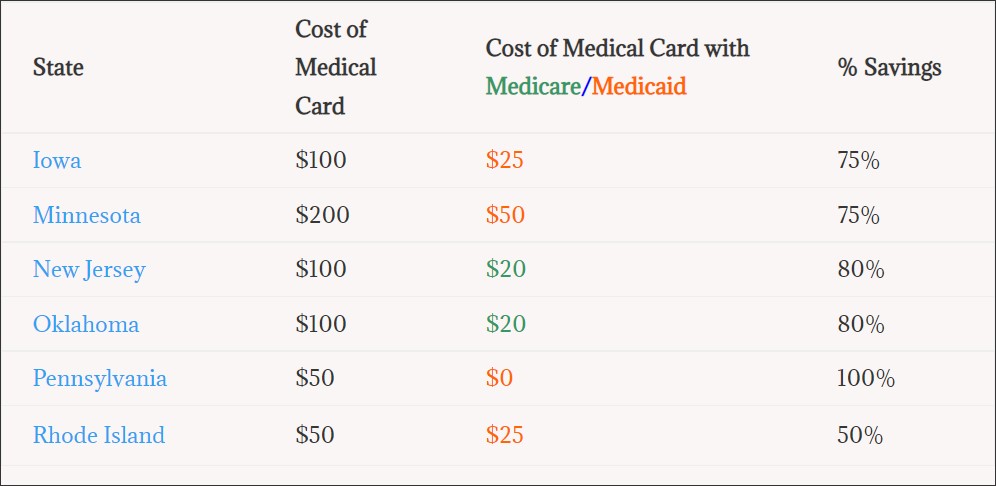Does Medicare Insurance Cover Medical Marijuana?
Written By QuickMedCards. Last Updated July 19, 2022
With the growing acceptance and legalization of medical marijuana across the United States, many Medicare recipients are wondering if their insurance will cover this alternative treatment option.
By the end of this page, you will have the answers to these questions:
- Is medical marijuana covered by Medicare?
- How can Medicare or Medicaid make medical marijuana cheaper?
- How do I apply for a medical marijuana card?
So, does health insurance cover medical marijuana? The short answer is no. Insurance does not cover medical marijuana. And the same applies to HSA and government-sponsored healthcare plans such as Medicare and Medicaid–even in states where medical marijuana is legal.
Still, despite not providing coverage, these government health plans can significantly reduce your overall medical marijuana costs. For instance, in some states, Medicare or Medicaid enrollment could shave 80% off your med card fees. Let’s take a deeper dive.

Why Medicare won’t (can’t) cover medical marijuana.
It’s not that Medicare won’t cover your cannabis purchases. Legally, it just can’t. The main reasons your Medicare plan won’t help pay for your medical marijuana include:
- Marijuana is illegal under federal law.
- Medical marijuana is not FDA-approved.
- Generally, Medicare does not cover the cost of experimental or unproven treatments.
- Finally, there is no mechanism for Medicare to pay for medical marijuana.
The exceptions–marijuana-based prescription drugs Medicare can cover.

Although Medicare won’t cover medical marijuana, certain cannabis-based prescription drugs are eligible for coverage. Specifically, under Medicare Advantage or Part D Prescription Plans.
It is worth noting that these MMJ-based drugs differ from other forms of medical marijuana. For instance:
- They are available from pharmacies, not dispensaries.
- Patients do not need a med card to access these prescription drugs.
- They are FDA-approved.
Epidiolex is one such drug whose cost may come down owing to Medicare coverage. It contains purified cannabidiol (CBD) and is used to treat seizures associated with tuberous sclerosis complex (TSC), Lennox-Gastaut syndrome, and Dravet syndrome in patients aged one and older.
Medicare prescription drug plans may also cover cannabis-like medications. For example, dronabinol (Marinol and Syndros) and nabilone (Cesamet). Cannabis-like because they do not come from marijuana. Instead, the drugs are lab-made THC. Marinol and Cesamet usually come as THC pills or capsules, while Syndros is liquid. These drugs mitigate chemotherapy-induced nausea and vomiting in cancer patients. Additionally, they help treat appetite loss and anorexia in AIDS patients.
How can Medicare or Medicaid make medical marijuana cheaper?
Depending on their home state, an individual can provide proof of enrollment in Medicare or Medicaid during their medical marijuana card application for a reduced fee. Besides the two, other assistance programs and groups may qualify for a discounted MMJ card. For example:
- Disabled veterans
- Indigent status
- Social Security Disability Insurance (SSDI)
- Supplemental Nutrition Assistance Program (SNAP) recipients
- Supplemental Security Income (SSI)
- Veteran status
Medicare vs Medicaid
Medicare and Medicaid have dominated the conversation on insurance and medical marijuana. But what are they? And what is the difference between the two?
Both are government-sponsored health insurance programs. Medicare is a federally-funded program that provides health insurance for Americans aged 65 and over, including some younger people with disabilities. On the other hand, Medicaid is a state-run program that provides health insurance for low-income Americans of all ages.
States where Medicare/Medicaid reduces the cost of the medical marijuana card.

How to apply for a medical marijuana card.
The application process for a medical marijuana card is similar in most states. Below is the most common procedure for getting a med card:
- Schedule an appointment with a state-licensed medical marijuana doctor.
- Get certified for medical marijuana. (In some states, the doctor provides a marijuana recommendation.)
- Apply for the state-issued medical card through the state medical marijuana program (MMP).
- Receive your medical marijuana card after MMP approval.
- Finally, purchase medicinal weed from your local dispensary.
The states that follow this process include:
Arizona | Arkansas | Connecticut | Delaware | Hawaii | Iowa | Louisiana | Maryland | Michigan | Minnesota | Missouri | Montana | New Jersey | New Mexico | New York | North Dakota | Ohio | Oklahoma | Pennsylvania | Rhode Island | West Virginia
Quick Med Cards makes getting a medical marijuana card easy. Besides facilitating fast online appointments with state-licensed MMJ doctors, we are also the cheapest med card provider in the states we serve!
Some states do not issue an official medical card. And for others, a state-issued med card is not necessary to lawfully buy, consume, and possess medicinal cannabis. Still, they require patients to have a recommendation/certification from a state-approved cannabis doctor. These states include:
How to get a marijuana prescription (medical cannabis Rx).
Physicians cannot prescribe marijuana because it is illegal under federal law. But things are a bit different in Texas.
Texans can only access medical marijuana with a cannabis prescription (Rx). To get your medical cannabis Rx through Quick Med Cards:
- Schedule an online appointment with a medical marijuana doctor in Texas.
- Attend your marijuana evaluation through video call.
- If our physician approves, they will enter a prescription in the Compassionate Use Registry of Texas (CURT).
- Visit any licensed marijuana dispensary in Texas for your medical cannabis Rx.
Cannabis and combat–What about veterans?

Veterans have long been using cannabis to cope with the effects of combat. Medical marijuana for post-traumatic stress disorder (PTSD) has proved valuable for military veterans struggling to readjust to civilian life. Marijuana’s ability to reduce anxiety and improve sleep quality has allowed them to better cope with the stresses of daily life.
While the Department of Veterans Affairs (VA) does not currently prescribe or help Veterans obtain cannabis, it is beginning to acknowledge its potential benefits. Additionally, it assures Veterans that participation in state medical marijuana programs does not affect their eligibility for VA care and services.
Quick Med Cards celebrates our heroes. And that is why we support the Wounded Warrior Project and other charities.
Key Takeaways
- Medicare and Medicaid do not cover medical marijuana, but state programs may offer discounts.
- Certain FDA-approved, cannabis-based prescription drugs like Epidiolex, dronabinol (Marinol, Syndros), and nabilone (Cesamet) are covered under Medicare.
- Enrollment in Medicare or Medicaid can reduce the cost of obtaining a medical marijuana card in some states.
- Other groups eligible for discounts include disabled veterans, SSDI, SNAP, SSI recipients, and veterans.
- Medicare is federally funded, while Medicaid is state-run.
Conclusion
Insurance providers like Medicare and Medicaid do not directly cover the cost of medical marijuana. But patients may enjoy discounted rates on their cannabis cards in state programs that offer reduced fees for beneficiaries of such programs. Additionally, medicinal cannabis, often used as a substitute for prescription opioids, has saved individuals and local governments millions in healthcare costs.
Most importantly, consult with your medical practitioner before starting a cannabis regimen. They will advise you on whether it is the best option for you. And if your doctor is not for cannabis as alternative medicine, our MMJ physicians are always here for you.
More information about medical marijuana and insurance
Below are answers to common questions involving medical marijuana and insurance.
Can a doctor prescribe CBD?
Since the FDA does not regulate CBD, it is technically illegal for doctors to prescribe it. However, this doesn’t mean you can’t discuss the possibility of using CBD with your doctor. They may provide you with a ‘recommendation’ for CBD, which you can use to purchase from a dispensary or an online store.
Do dispensaries take insurance?
Currently, most dispensaries do not accept insurance as a form of payment. As mentioned earlier, marijuana is still illegal under federal law and not FDA-approved. Additionally, dispensaries do not operate like pharmacies. For those reasons, most insurance providers do not help patients with medical marijuana purchases. However, this may change in the future as the industry continues to evolve and become more regulated.
Does having a medical card affect your health insurance?
A medical marijuana card is not a determining factor for insurers when determining health insurance rates. However, using medicinal cannabis can affect your life insurance rates and result in higher premiums. For instance, if you take medical marijuana to treat a terminal condition, it may be challenging or impossible to find coverage. Moreover, if you smoke cannabis, insurers are likely to classify you as a smoker–resulting in an expensive policy. You can avoid this by opting for edibles and other forms of marijuana instead of smoking.
Get Your Medical Marijuana Card
Same-day appointments available for online medical marijuana evaluation.
Get your certification now!
